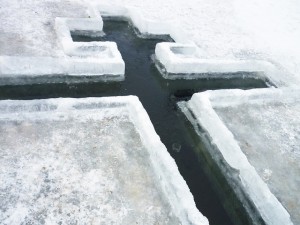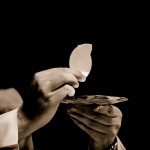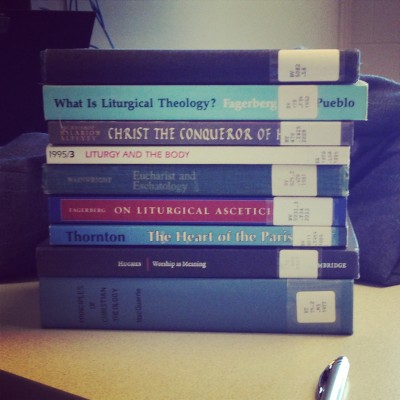I have included both the transcript to my sermon and the audio link below. They are somewhat different. Cheers!
For the 103rd time yesterday, a group of 197 riders were sent out from Mont Saint Michel along the coast of France. Each rider bears the name of his institution along his back, representing his people (both nationally and locally) along the way. These riders, these pilgrims if you’ll allow me the metaphor, were sent out with a common goal along a common route toward a common destination. Their destination is to arrive in Paris in 23 days after 2300 miles of travel. Their road is along the coast, through the plains, up the mountains and down the valleys…in short, their course is any road surface available along the designated route. Their goal is common: to arrive in the shortest amount of time. The rider who has the fastest time wins and stands underneath the Arc de Triomphe.
I’ve attempted to shroud this in mystery, but can anyone tell me the event I’ve just described? Yes, it is the Tour de France and this Francophile has watched it every year for the last decade. Now, the analogy isn’t entirely perfect but I actually believe that it may help us set our minds on today’s lessons. You see, the riders have to be people of endurance, of intelligence, of fitness, and of purpose. Their journey is not unlike the Christian journey that we read about in today’s lessons. Jesus sends his apostles out in his name, along a route, with a common mission toward a common end.
Now, if you read your lessons ahead of time or were paying attention while our readers read so excellently, then you will likely have some questions. I want you to know that in the course of this sermon I will explain to things that may have given you pause for thought: “law of Christ” and “Israel of God.” Pay attention for the answers.
Let us pray.
I like giving away the farm up front rather than making you guess and wonder where I’m going. Our passages from 2 Kings and Luke provide the meat of this sermon while Psalm 30 and Galatians help fill in some of the details. If you hear nothing else today then hear this: you have been sent out by our Lord in order to minister in his name. You are to love God and to love people.
Here are some guiding questions for our time together: To whom are you sent? Why are you sent? Where are you sent?
We begin with Elisha in 2 Kings. Remember from last week that Elisha asked Elijah, his master and mentor, for a double-portion of his blessing. That is, he asked to become his successor. Elijah was taken up in a whirlwind of fiery chariots and Elisha is left with his master’s cloak and mantle. He is the new prophet of Israel.
The story begins with an Aramean soldier named Naaman. Here’s what you need to know: Arameans and Hebrews did not get along. Ever since David’s reign the two had been at odds with one another. Keep this in mind…but why does the passage say that the LORD gave them victory? Well, Israel is entering into her period of lengthy captivity as the hands of foreign oppressors due to her wickedness and waywardness, her covenant unfaithfulness. The Arameans were simply one such foreign aggressor.
Naaman and his army captured an Israelite girl in one of their raids and it this young girl who suggests that he see the prophet Elisha. For this time period and culture, it is amazing that Naaman would act on the advice of a slave girl. This goes to demonstrate, likely, just how desperate he was. All of the military fame and favor of his master could not detract or distract from that fact that he was a leper.
Don’t miss the fact that Naaman approached the King of Israel. That is, an unclean leper—one who was an untouchable and unlovable—not to mention a foreign militant, approaches the King of Israel. For our purposes here today what is important is that Naaman eventually makes it to Elisha who sends him out to wash. Naaman follows the instructions of the prophet and is made clean.
I have a lot more to say about this story in a little bit, but notice that all of the wrong sort of people are involved here: a foreign, militant leper and a slave girl. This story would have no basis for fact or efficacy in normal society. And yet, and yet, in the middle of Israel’s captivity and wickedness we see that YHWH’s plan for redemption is that same that it always has been: that the whole world would be blessed through Israel.
Now to Luke. Also remember from last week’s sermon that Jesus has just “set his face like flint toward Jerusalem.” Everything that follows this famous sentence is therefore an intentional step toward the cross.
I fear that we tend to miss the opening sentence of this pericope when we read it. The 70 aren’t sent anywhere, willy nilly. No, rather they are sent ahead of Jesus to every place he was intending to go. This means they were sent along the via crucis, the way of the cross, and were called to prepare the way. They are forerunners, prophets of the coming Good News, messengers of the messiah (even if they didn’t know that detail).
They are given instructions and guidelines, fairly basic stuff: no bag, no purse, no sandals. They will be relying on the hospitality of those to whom they are sent. Be bringers and bearers of peace. Stay in one place. Bless those who bless you. Curse those who curse you. Come back.
Jesus makes it abundantly clear that they are to do everything in his name and all that is done to them is really done to him. They bear witness to Jesus. They are not to go out on their own and make a name for themselves or minister of their own accord. They are amazed upon their return as the demons submitted to them. But let’s be real here: the demons didn’t submit to them—the demons submitted to the name of Jesus. These apostles are building for the Kingdom rather than building their own kingdom. Jesus finally reminds them that the best news is that their names are written in the Kingdom of God.
This story is far more about the name and power of the one whom the apostles represent rather than the works they are able to accomplish. The instructions that Jesus gives them are still relevant today but only within the context of obeying his commands and going where he sends us. Without knowledge of the Sender and his sending instructions we are unable to be faithful sent out ones.
Is not Psalm 30 a perfect picture for anyone who has cried out to God in both despair and thanksgiving? This Psalm, and there any many budding and burgeoning Psalmists among you, portrays a grateful heart magnificently.
People who are sent are people of several charisms:
We are people of the bath – Naaman, baptizien. A prefiguring of baptism. Luke 4 tells us that Naaman was the only leper cured of leprosy by Elisha in all of Israel. And a foreigner at that. Naaman is baptized, as it were, by the instructions of Israel’s prophet and in the grace of YHWH. We need to remember our own baptismal covenant. That’s why there is Holy Water on the column as you walk into the chapel. As you pass by the water, consider perhaps dipping your thumb, index finger and middle finger in the water and marking yourself with the sign of the cross. Remember that in baptism we are put to death and brought back to life in Jesus’ baptism. Baptism is a covenant, a promise, a commission, a call to ministry. People of the bath invite others to wash away their sins.
We are people who do the next right thing – this isn’t my most poetic point ever, but the point is crystal clear: we are to do the next right thing according to the law of Christ. I told you I’d give you the information. You probably heard that term and thought to yourself like good Calvinists, “But under Christ there is no law! We are saved by grace!” To which I would say, “Ah, yes, but…” The Law of Christ is the law of love. It is forgiving as Christ forgave, loving as he loved, living as he lived. The law of Christ is simple and our collect captures it perfectly: love God and love people. You are always faced with a decision, in every situation: do I do the next right thing or don’t I? The measurement tool is simple: will this action demonstrate my love for God and others or not? Do the next right thing!
We are people of peace – Jesus told his disciples to bring peace and to find people of peace in the city. The shalom of God looks like the love of God in action. It is easy to sit behind our computer screens and launch virtual grenades at those who disagree with us about politics, religion, football, anything. It is easy to sit in our cars and judge everyone else on the road as terrible drivers. I’ve never done that. But how much harder—and better—is it for us to embody peace. Jesus would later tell his disciples, “My peace I leave you, my peace I give you.” Jesus is the Prince of Peace, the Shalom of God, and he calls us to act likewise. How are we doing? Could you be described as a peaceful person? Now that you’ve answered, be honest with yourself and answer again…
We are people with a mission – The mission is simple: Go where Jesus is sending you, go bearing his name, and return to him (every Sunday) and share your work. You are building for the Kingdom, you are sentries at the outposts, you are signposts of the coming King. Now, you may be sitting here saying, “God isn’t sending me anywhere.” Guess what? That’s the point! You are sent into your daily life. You don’t have to have to be a missionary to China, or Russia, or anywhere else…but if you’re called there then GO!…the Holy Spirit empowers each of us for daily living: your family, your job and coworkers, your neighbors, the strangers you meet at the bank…they are your mission field and you are called to share Jesus with them.
Instead of hoping to be the one person who arrives in Paris with the best time and is the new champion of the Tour de France, we hope to journey together. Ellis has said to me for years, “I want to climb a mountain and get to the summit with a group so we can all share in the view and victory.”
During ordinations it is quite normal for the soon-to-be-ordained to receive a charge from the man or woman preaching the sermon. I asked Cindy and Ellis to each preach at one of my ordinations and each of them charged me in my ministry. I was asked to stand, with palms held up, in order to receive these words of spiritual direction and encouragement.
You are ordained. Through the font and waters of baptism, you have been set apart for ministry in the Kingdom of God. So, as “sent out ones,” I now ask each of you to stand and receive your charge.
Love God and love people. As you are going throughout your days, your daily dealings, and all that life has for you, demonstrate the love of God to a world in desperate need of hope. Through your words and actions, point others to Jesus. Be people of the bath, remembering that you have put the old self to death and risen in resurrection of Jesus. Be a people of forgiveness and forgive freely as you have been forgiven. Be a people of peace, sharing the shalom of God with all whom you meet. Be people committed to your mission: building up God’s kingdom in his name. Journey together and return here for nourishment, encouragement, fellowship, and worship.













